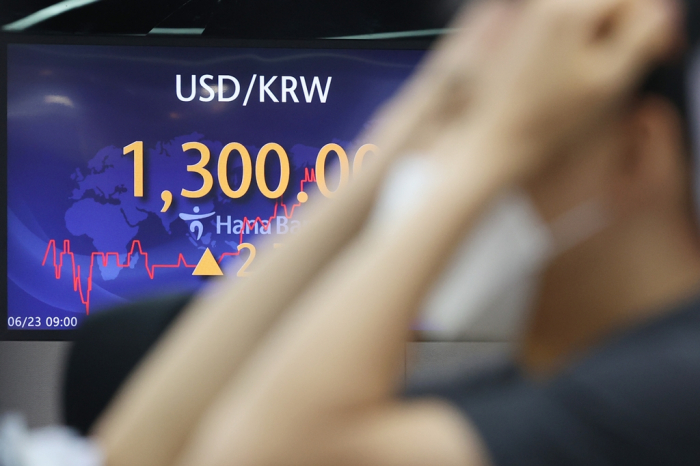
KEB Hana Bank's dealing room on June 23, 2022 (Courtesy of Yonhap) South Korea’s won hit a 13-year low, weakening past the psychologically important 1,300 per US dollar level for the first time since the 2008-09 global financial crisis, as growing expectations of global tightening exacerbated recession fears.The won on Thursday declined as much as 0.4% to 1,302.8 against the dollar, the weakest since July 14, 2009. The South Korean currency has lost more than 8% so far this year, becoming the worst performer among emerging Asian currencies, after an 8.6% drop in 2021.Foreign exchange authorities were suspected of buying the won after a warning, currency traders said, but the local unit failed to recover stronger than the 1,300 level during the domestic currency market.“The won could weaken further on growing worries about inflation, exports and domestic demand,” said Joo Won, a senior economist at Hyundai Research Institute.The weakness came as US Federal Reserve Chair Jerome Powell on Wednesday admitted to the possibility of a recession.“We are not trying to provoke, and I don't think we will need to provoke, a recession," Powell said at a hearing before the US Senate Banking Committee, but he acknowledged that a recession was "certainly a possibility."The Fed is “strongly committed” to bringing prices under control and policymakers are acting "expeditiously to do so," Powell said."It is essential that we bring inflation down if we are to have a sustained period of strong labor market conditions that benefit all," he said.The Fed’s hawkish stance amid growing fears of a recession knocked down South Korean stock markets. The main Kospi lost 1.22% and the junior Kosdaq tumbled 4.36%.Last week, the US central bank took its most aggressive tightening step since 1994 by raising the target federal fund rate by 75 basis points (bps).HIGHER US RATES AMID RECESSION RISKS TO HIT S.KOREA HARDSouth Korea is expected to suffer more if the Fed’s further rate hikes raise the recession risk around the world as it will slash exports of Asia’s fourth-largest economy. A weaker won is unlikely to boost price competitiveness in overseas markets as other currencies also softened versus the dollar.The country’s trade deficit has already been ballooning. It reported a shortfall of $14.5 billion won from Jan. 1 to June 20, according to the customs office, on course to log the largest half-year deficit in history.The government expected the current account surplus to nearly halve to $45 billion in 2022 from $88.3 billion last year.“South Korea’s exports are likely to slow as its main export items are industrial products that are vulnerable to a global recession,” said Moon Hong-cheol, an economist at DB Financial Investment. “On the other hand, many other emerging countries are exporters of raw materials and they are not hurt much by the recent surge in global commodity prices.”Foreign investors continued to dump Seoul shares. They have sold a combined net 19.1 trillion won ($14.7 billion) in the local stock markets so far this year after unloading 26 trillion won in 2021, the Korea Exchange data showed.BOK MAY TAKE A BIG STEPA weakening won is likely to further accelerate inflation, which has already hit a 14-year high. Consumer prices in May rose 5.4% from a year earlier, the largest increase since August 2008.South Korea’s central bank predicted inflation in June and July to exceed the current level, prompting a forecast that the growth in consumer prices this year will top 4.7% reported in 2008.The Bank of Korea is expected to speed up interest rate hikes to bring the rampant inflation under control.BOK Governor Rhee Chang-yong said on June 21 that the central bank expected inflation in 2022 to be higher than its forecast of 4.5% announced less than a month ago.“It is desirable to manage the monetary policy centered on inflation when inflation continues to accelerate as it is now,” Rhee told reporters. BOK Governor Rhee Chang-yong speaks to the press on June 21, 2022 (Courtesy of Yonhap) The comment came amid increasing expectations that the central bank may raise interest rates by 50 bps for the first time at its monetary policy meeting on July 13.It already delivered a back-to-back interest rate hike for the first time in 15 years last month.SUSPECTED INTERVENTIONSouth Korea’s foreign exchange was suspected of intervening in the market after Finance Minister Choo Kyung-ho warned against the won’s weakness.Choo said that foreign exchange authorities will take steps to stabilize the currency market, if needed, to minimize market jitters caused by the won's weakness.“The government will also make policy efforts to ease imbalances in the market," he added.But the authorities are likely to slow the won’s weakness rather than targeting specific levels, market participants said.“The won may soften to as weak as 1,350 (against the dollar) by the end of this year,” said Baek Seok-hyun, an analyst at Shinhan Bank.(Updates with suspected intervention, details, analysts’ comments)By Mi-Hyun Jomwise@hankyung.comJongwoo Cheon edited this article.
Most Read